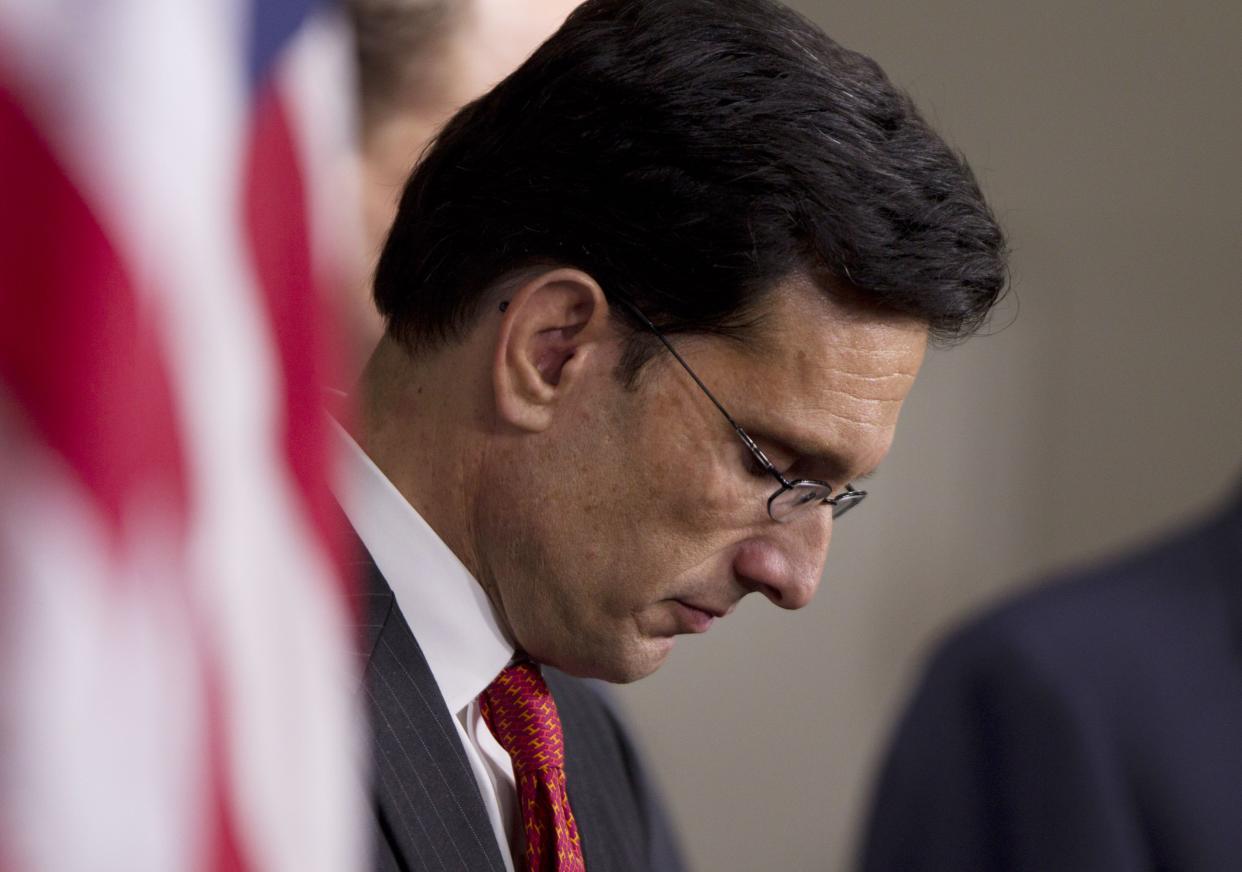Eric Cantor’s old political group regroups as a policy shop for the right
The Young Guns Network renames itself, hires Cantor’s former policy adviser

WASHINGTON — When Eric Cantor was unceremoniously booted from Congress last year — suffering a shocking primary election loss in June and then choosing to step down instead of serving out his term — it thrust the outside political group he had created into uncertainty.
The Young Guns Network had just hosted a very successful event focused on policy, but with Cantor gone, it was unclear whether the group, perceived by many to be devoted to helping him on his assumed path to become the next speaker of the House, would continue.
It has endured — and this month it hired Neil Bradley, Cantor’s former top policy adviser, as chief strategy officer to bring more policy depth to the organization and help it reposition itself for the 2016 presidential cycle.
As part of that, YG is shedding its Cantor-era name. It will remain a 501(c)(4) advocacy group that can receive unlimited, undisclosed donations, but will now be known as the Conservative Reform Network (CRN). The new name is a nod to the role it is seeking to play now, that of a group bringing organization and cohesion to the disparate elements that make up the reform conservatism movement.
John Murray, another former top Cantor aide who has run YG since 2011, told Yahoo News that CRN in its new incarnation will be a “convener of brain power” and referred to “this reformicon engine room that we’re building."
Bradley and Murray both said the group will be focused on pushing the GOP’s national platform — particularly in the case of the party’s presidential candidates — toward a set of policies that have resonance with middle-class voters: college affordability and quality, education reform and choice, access to capital for small businesses and entrepreneurs, tax reform that helps families as well as businesses, criminal justice reform, housing and "urban issues too often neglected by folks on our side,” according to a memo written by Murray and Bradley.
“It’s an effort to ensure there is an agenda that speaks to people now, not hitting refresh on what spoke to them a decade ago,” Bradley said.
In this sense, there is a similarity between what Murray and Bradley are aiming to do and what the Democratic Leadership Council did for Democrats in the 1980s and early '90s. Under Al From, the DLC helped self-described New Democrats coalesce around ideas and policies that worked against some of their major weaknesses, namely that they were perceived as anti-business, weak on defense and weak on crime.
"YG has been very important and effective at pushing conservatives to translate our principles into concrete policy ideas, at communicating those ideas to some natural allies on the activist and tea party right, and at using those ideas to press congressional Republicans to actually advance conservative priorities,” said Yuval Levin, editor of National Affairs, a conservative policy magazine, and a leading intellectual among the reform crowd. "They’ve filled a real gap."
Murray said that the “Room to Grow” agenda that was unveiled at the group's event last spring has “changed the conversation.” Liberals may still disagree with how to help middle-class voters overcome wage stagnation and the economic cross-pressures they are under in the modern economy, but, Murray and Bradley both said, it is now harder for the left to accuse conservatives of neglecting the conversation and those voters.

"It is true that the contributors [to Room to Grow] are somewhat more concerned about the fate of the 85 percent of Americans who identify as middle class and … those who identify as poor than they are about those who feel as though they’ve managed to join or remain in the ranks of the upper class in recent years, despite the housing bust, the financial panic, and an economy stymied by excessive regulation, among other maladies,” wrote Reihan Salam, another of the reform conservative thinkers. "This doesn’t strike me as a sign of contempt for those who’ve proven successful, but rather as a recognition that we as a society would be better off if more Americans were on their way to the economic independence that comes with wealth."
It’s a significant shift from where YG started out.
In the 2012 election, the YG Network spent almost $2.9 million, and the YG Action Fund, the super PAC affiliated with the group, spent even more: $4.7 million. Much of the group’s money went to TV ads in contested congressional races. It was clearly a vehicle through which Cantor could help other House members in their elections.
Even before Cantor lost his primary last spring, though, YG had started to focus on policy, convening GOP elected leaders and some of the top minds in conservatism at an event at the American Enterprise Institute. In the 2014 elections, the super PAC spent no money, and the YG Network itself spent only $1.6 million.
Over the next 18 months, CRN will be meeting with the 2016 presidential hopefuls, as well as with governors, Murray and Bradley said. And one of CRN’s top officials, policy director April Ponnuru, will be an adviser to former Florida Gov. Jeb Bush’s likely presidential campaign starting around June.
CRN will host a “policy summit” April 9-11 and will release policy books every few months, they said.
Cantor, meanwhile, landed a high-paying investment banking job last fall and has since started to re-engage with politics, reconnecting with his political and fundraising networks. There is talk that another run for statewide or national office may be in his future.




